There is mind blowing chatter in India and around the world about saving the environment and living a sustainable life when it comes to fashion, which is considered the second most polluting industry in the world. The word ‘sustainable’ is added to apparel labels randomly but very few designers ‘walk the talk’. Four designers have made it their life’s mission to create great looks by using pure sustainable fabrics or working with recycled/upcycled materials, which are varied and at times have moved away from the textile waste.
WITHOUT by Anish Malpani
When it comes to sustainability in fashion, designers normally opt of the recycling/upcycling of fabric and garment waste. But Anish Malpani, founder of the ‘Without’ label creator of sunglasses and frames, who won the 5th edition of the Circular Design Challenge at Lakmé Fashion Week in partnership with FDCI in October 2023; zeroed in on packages of chips from multi-layered plastic for eyewear.
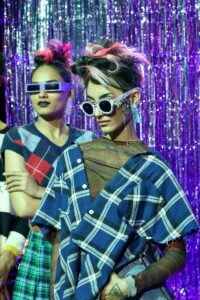
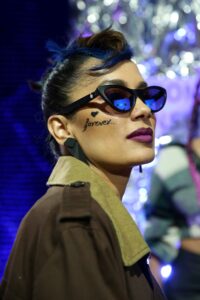
“We brainstormed over 400 products and shortlisted 70, which revolved around complexity, average, Amazon searches, Amazon Modules, etc. in that, sunglasses scored high as an application of our material instead of furniture, pots or bricks, which most people make,” reveals Anish Malpani.
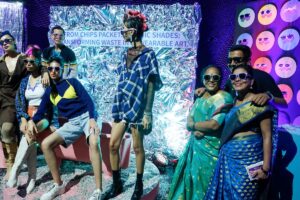 The brand had an interesting presentation at Lakmé Fashion Week in partnership with FDCI in March 2024, with the collection “Metamorphique” created into an haute look for sunglasses and the launch of three new colours. Along with that there was a DIY eyewear innovation, when one can attach jewellery and bling onto sunglasses. At the unique display, Anish brought to the forefront the waste pickers who have been the main source for the plastic waste. Dolled up in colourful saris and wearing funky eyewear, the ladies gave tough competition to seasoned models as they posed.
The brand had an interesting presentation at Lakmé Fashion Week in partnership with FDCI in March 2024, with the collection “Metamorphique” created into an haute look for sunglasses and the launch of three new colours. Along with that there was a DIY eyewear innovation, when one can attach jewellery and bling onto sunglasses. At the unique display, Anish brought to the forefront the waste pickers who have been the main source for the plastic waste. Dolled up in colourful saris and wearing funky eyewear, the ladies gave tough competition to seasoned models as they posed.

 The brand’s website without.live is the e-commerce platform and Anish is looking at getting into sites like Amala Earth, Flourish, Brown Living and SustainKart. Plans are on to retail with two opticians and sunglass sellers as well as associate with eyeglass brands like Lenskart and corporate gifting.
The brand’s website without.live is the e-commerce platform and Anish is looking at getting into sites like Amala Earth, Flourish, Brown Living and SustainKart. Plans are on to retail with two opticians and sunglass sellers as well as associate with eyeglass brands like Lenskart and corporate gifting.
 The ‘Without’ brand has already attracted the Gen Z millennials between the ages of 20 and 40 years. Their publicity has been very limited but thanks to the appearance of the brand on Shark Tank India and an interesting story on History TV, the response has been very good. “The addition of jewellery has made the brand more interesting to the fashion forward buyers, while the base material right now is multi-layered plastic, the brand will also look at e-waste, organic waste, etc in future,” informs Anish. Pricing is very wallet friendly starting at Rs 299 to jewellery, Rs 799 for frames and Rs 999 for sunglasses. ‘Without’ is a very young brand, barely two years old, so Anish admits the turnover last year was Rs 25-30 lakhs with zero advertising but with the many marketing ideas and the encouraging responses, it looks as though the ‘Without’ brand will be seen on the bridges of many stylish noses in future.
The ‘Without’ brand has already attracted the Gen Z millennials between the ages of 20 and 40 years. Their publicity has been very limited but thanks to the appearance of the brand on Shark Tank India and an interesting story on History TV, the response has been very good. “The addition of jewellery has made the brand more interesting to the fashion forward buyers, while the base material right now is multi-layered plastic, the brand will also look at e-waste, organic waste, etc in future,” informs Anish. Pricing is very wallet friendly starting at Rs 299 to jewellery, Rs 799 for frames and Rs 999 for sunglasses. ‘Without’ is a very young brand, barely two years old, so Anish admits the turnover last year was Rs 25-30 lakhs with zero advertising but with the many marketing ideas and the encouraging responses, it looks as though the ‘Without’ brand will be seen on the bridges of many stylish noses in future.
CHOLA by Sohaya Misra
 The ‘Chola’ label started by Sohaya Misra nearly a decade ago, still manages to make audiences sit up and appreciate the brand’s collections with the innovative and quirky styling that Sohaya is known for. The latest collection at Lakmé Fashion Week in partnership with FDCI called “Let’s Play” was exactly what the name stated. It was once again a ‘go-to’ choice for fashion forward individuals.
The ‘Chola’ label started by Sohaya Misra nearly a decade ago, still manages to make audiences sit up and appreciate the brand’s collections with the innovative and quirky styling that Sohaya is known for. The latest collection at Lakmé Fashion Week in partnership with FDCI called “Let’s Play” was exactly what the name stated. It was once again a ‘go-to’ choice for fashion forward individuals.
Sohaya is known to favour a monochromatic story of black and white but this season she added a large dose of vibrant colours. The colour palette was a riot of hues with mustard, red, blue, grey and orange along with weaves and patterns like ikat and prints that offered an interesting variety and were the base of the multi layered, fluid creations. The fabric choice for Sohaya has always been pure and natural, with organic cottons and linens, 100 per cent, pure linen, yarn dyed linens as well as soft naturally dyed muls. This season the Chola label also added denim but with the marked characteristic touches of the brand.


“Every collection we do is inspired by the fabrics. Once we have zeroed in on our textile board then the designs follow one garment at a time bringing our collection together,” informs Sohaya. For the latest collection there were tribal cotton jacquards from Bijnor, Uttar Pradesh and handwoven ikat fabrics from Telangana, Andhra Pradesh. “I loved the idea of working with the big bold ikat and tribal prints and giving them in an edgy and modern vibe. Since I don’t embellish my fabrics this added a real fun element to the collection.”
 As a designer Sohaya has never followed a trend. “I go with my heart and of course the fabrics are the hero of the show. I prefer to design pieces that are timeless and have room to be styled in different ways. Also staying true to my design aesthetics and brand DNA has helped us sustain the last 8-9 years.” Production is through a small in-house unit where 150-160 pieces are produced in a month. Sohaya is known for her deconstruction of silhouettes and free cutting technique. Her emphasis on 3D silhouettes along with flirty frills and flounces gives a playful element to the apparel. Sohaya’s popular and favourite one-minute sari has always been a crowd puller and has been incorporated in every collection.
As a designer Sohaya has never followed a trend. “I go with my heart and of course the fabrics are the hero of the show. I prefer to design pieces that are timeless and have room to be styled in different ways. Also staying true to my design aesthetics and brand DNA has helped us sustain the last 8-9 years.” Production is through a small in-house unit where 150-160 pieces are produced in a month. Sohaya is known for her deconstruction of silhouettes and free cutting technique. Her emphasis on 3D silhouettes along with flirty frills and flounces gives a playful element to the apparel. Sohaya’s popular and favourite one-minute sari has always been a crowd puller and has been incorporated in every collection.
When it comes to unconventional silhouettes and designing that follows the sustainable route, but in a trendy contemporary manner, then the ‘Chola’ brand by Sohaya Misra ticks all the right boxes.
AKAARO by Gaurav Jai Gupta
 Long before the Indian fashion world was aware of the sustainable story and recycling/upcycling and creating fabrics from waste, Gaurav Jai Gupta’s ‘Akaaro’ label had already embarked on work for this concept. Since 2010, Gaurav has experimented by weaving steel yarn with other natural options and the result made his label not only well known in India but also globally.
Long before the Indian fashion world was aware of the sustainable story and recycling/upcycling and creating fabrics from waste, Gaurav Jai Gupta’s ‘Akaaro’ label had already embarked on work for this concept. Since 2010, Gaurav has experimented by weaving steel yarn with other natural options and the result made his label not only well known in India but also globally.
His latest collection “Moonrise” at Lakmé Fashion Week in partnership with FDCI was a fashionable story that revolved around invented textiles, which were visualised from amazing engineered unused scrap yarn. Gaurav’s first attempt at this was in 2022 when he created a collection from innovatively woven textiles. His research resulted in yarns like cotton, silk and linen that were given a rebirth and turned into revived silks, cotton, linen and molten metallics.
Gaurav reveals that the process takes 2-3 months before a fabric is created. “We work both with waste yarn as well as waste fabric. Waste yarn gets segregated, cleaned, and then aligned and we make a multicoloured warp and then we use the same yarns for weft. For the “Moonrise” collection we developed silk cotton, bamboo, cotton silk metallic, silk metallics, hand spun cotton, chambray.” The fabrics this season were developed from waste yarn over the years in the studio. Gaurav also added denim finishes for handloom as well as knits.

 Gaurav admits that his fashion journey hasn’t been easy. “I have just been doing my work and following my inner calling. There have been highs and lows, but we have continued to grow, and my audience has made sure that we are able to make things we love.”
Gaurav admits that his fashion journey hasn’t been easy. “I have just been doing my work and following my inner calling. There have been highs and lows, but we have continued to grow, and my audience has made sure that we are able to make things we love.”
 When a collection is from a fabric base that is recycled/upcycled the customer profile is often a niche segment. “Akaaro is for strong independent women. People who have a clear mind. A lot of people from creative disciplines like art, architecture, music , literature etc,”emphasises Gaurav.
When a collection is from a fabric base that is recycled/upcycled the customer profile is often a niche segment. “Akaaro is for strong independent women. People who have a clear mind. A lot of people from creative disciplines like art, architecture, music , literature etc,”emphasises Gaurav.
The retail outlets seem to be rushing to stock the ‘Akaaro’ brand. Ensemble’s branches in Mumbai, Delhi, Hyderabad and Ahmedabad are regulars, while Cinnamon, Bengaluru; Bombaim, Kolkata; Deval, Ahmedabad; Doki Doki, Mumbia; Aza, Mumbai and Collage, Bengaluru are part of the Akaaro retail roster. Most ‘Akaaro’ collections offer a variety of silhouettes and oversized shapes for jackets, blazers draped dresses and some extremely creative drapes for saris, which are strong sellers. The ‘Akaaro’ label by Gaurav Jain Gupta has always focused on a sustainable development for fabrics with research and experiments, which seem to have ensured that the brand has a firm hold on the fashion scene.
PAIWAND STUDIO by Ashita Singhal
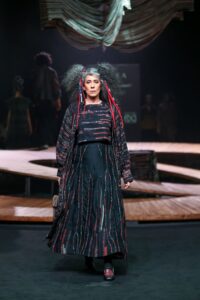 Ashita Singhal, a fashion design graduate from Pearl Academy, Delhi did not take the bridal/festive wear route. Instead, she dedicated her learning to make the world and earth a better place to live in. Her ‘Paiwand Studio’ label started in 2018 was one of the finalists of the 2021 Circular Design Challenge contest. In 2024 she walked off with the “NEXA presents The Spotlight” award of Rs 8 lakhs towards the set design at Lakmé Fashion Week in partnership with FDCI and presented a spectacular collection called “City Blues”.
Ashita Singhal, a fashion design graduate from Pearl Academy, Delhi did not take the bridal/festive wear route. Instead, she dedicated her learning to make the world and earth a better place to live in. Her ‘Paiwand Studio’ label started in 2018 was one of the finalists of the 2021 Circular Design Challenge contest. In 2024 she walked off with the “NEXA presents The Spotlight” award of Rs 8 lakhs towards the set design at Lakmé Fashion Week in partnership with FDCI and presented a spectacular collection called “City Blues”.
Ashita used waste from city billboards, discarded leather, textile waste, velvets and urban waste for great looking garments and accessories. Her sources for the waste have always been the artisans, ragpickers, design and export houses. To create a metre of fabric it takes two days to produce, and the process is long and laborious but the end result is very fashion forward. The brand has breathed new life into the Delhi weaving cluster, embracing sustainable production methods rooted in age-old craft techniques.
As a designer Ashita knows the importance of stylish silhouettes. “Our garments are designed through a collaborative process that blends traditional craftsmanship with contemporary aesthetics, all the while maintaining a strong commitment to sustainability. Drawing inspiration from nature, cultural heritage, and the materials themselves, our design vocabulary reflects a celebration of the natural world’s beauty. We integrate traditional handcrafted techniques into our designs, infusing them with a modern twist to create timeless pieces.”
 Besides creating collections of garments, Ashita’s footwear collection Nakshi in collaboration with Oceedee using upcycled leather off-cuts resulted in a stunning sell-out range of shoes available on Oceedee’s online platform and other retail partners. Ashita also adds, “We are excited to announce our upcoming handbag collection in collaboration with Adisee, a renowned leather accessories brand. Utilising our textiles, we’ve applied them to some of Adisee’s classic styles, resulting in a beautiful range of upcycled bags. This collection will soon be launching on both our websites.”
Besides creating collections of garments, Ashita’s footwear collection Nakshi in collaboration with Oceedee using upcycled leather off-cuts resulted in a stunning sell-out range of shoes available on Oceedee’s online platform and other retail partners. Ashita also adds, “We are excited to announce our upcoming handbag collection in collaboration with Adisee, a renowned leather accessories brand. Utilising our textiles, we’ve applied them to some of Adisee’s classic styles, resulting in a beautiful range of upcycled bags. This collection will soon be launching on both our websites.”

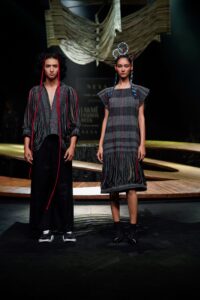 Marketing is through the brand’s website and Instagram accounts and also available on international platforms like Xtant. In India Elan, Ahmedabad; Neel Sutra, the Oberoi Gurugram; Dukan, Six Sense, Vana Mussoorie, Dehra Dun; Ogaan Mumbai and New Delhi; Vayu and Design Living, New Delhi; stock the Paiwand Studio label.
Marketing is through the brand’s website and Instagram accounts and also available on international platforms like Xtant. In India Elan, Ahmedabad; Neel Sutra, the Oberoi Gurugram; Dukan, Six Sense, Vana Mussoorie, Dehra Dun; Ogaan Mumbai and New Delhi; Vayu and Design Living, New Delhi; stock the Paiwand Studio label.
Ashita is delighted that she has a customer base that is on the same wavelength as her design sensibilities. “Their overwhelmingly positive reactions reflect a growing interest in sustainable fashion and appreciation for our innovative approach. Beyond simply purchasing clothing, they are actively supporting our mission to reduce waste and promote eco-conscious practices in the fashion industry. It’s truly heartening to see our efforts resonating with our audience, as they recognize and value our commitment to pushing the boundaries of creativity and craftsmanship within the realm of sustainable fashion. Their feedback serves as validation of our mission and inspires us to continue pioneering in this space.”
Ashita Singhal works on a very organised operation of a one-year planning schedule for launching the collection for fabrics and apparel. Creating fabrics and garments from recycled/upcycled waste has made the ‘Paiwand Studio’ by Ashita Singhal into one of the most well-known brands that has taken the sustainable concept onto a classic, stylish level.
